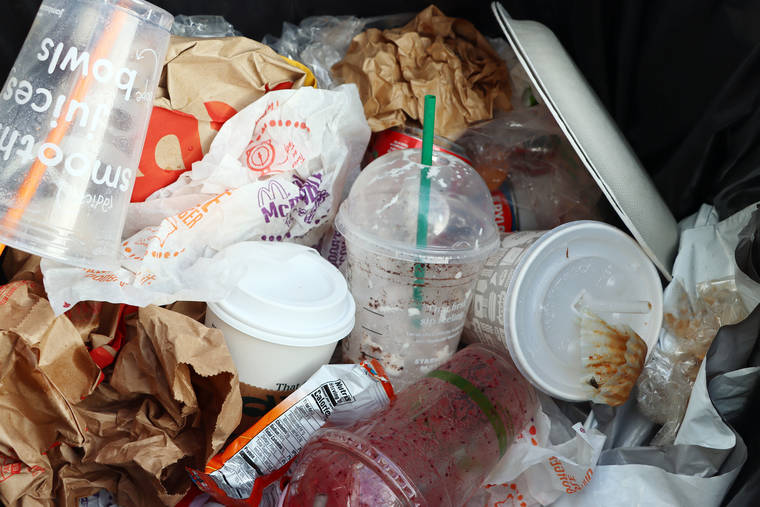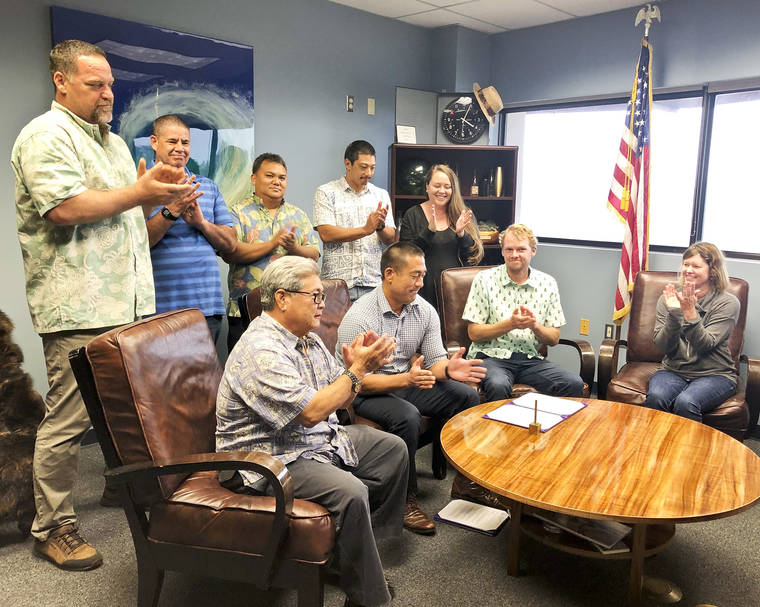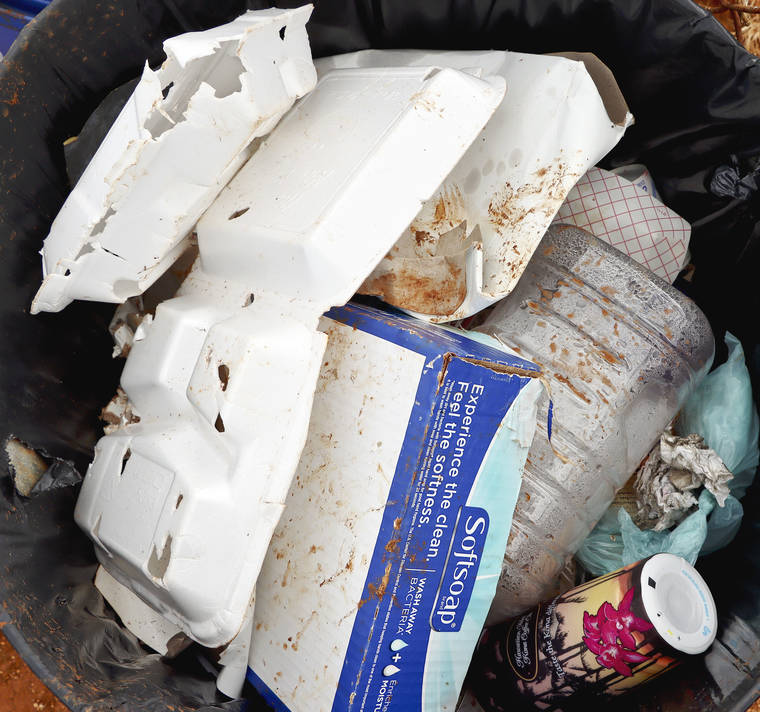When the 2020 edition of the Kaua‘i County Farm Bureau Fair opens in August, there is a strong possibility there will be no plastic bottled water available, said Sandi Kato-Klutke of the Kaua‘i County Farm Bureau.
Instead, the Kaua‘i County Farm Bureau is working with a bottled-water provider to establish hydration stations and encourage the use of reusable water bottles.
This discussion by farm fair organizers comes on the heels of the signing of a County of Kaua‘i administrative policy prohibiting disposable plastics on county property by Mayor Derek Kawakami last month, and the draft bill for an ordinance amending Chapter 22 of the Kaua‘i County Code by establishing a new article restricting the use and sale of polystyrene foam food-service containers that was heard before the Kaua‘i County Council also last month.
The policy declares that the county agencies and other authorized entities using county facilities will be prohibited from purchasing and distributing disposable plastics, including bottled water, plastic beverage straws, stirrers, cutlery, food-service ware and plastic bags. This includes purchases made for county offices, facilities, county events, and events funded by the county through grants or other means.
“Our main goal with this measure is to encourage our community to limit the use of these wasteful products that are harmful to our environment and animal habitats, and shorten the lifespan of our landfill,” Kawakami said in statement made on the signing of the administrative policy.
“We are also dedicated to lead our community by example. We want to show our community what we as the County of Kaua‘i are doing to be part of the solution instead of contributing further to our own solid-0waste and environmental issues.”
These sentiments were echoed by Kaua‘i County Councilmembers Mason Chock and KipuKai Kuali‘i, co-authors of the draft bill restricting the use and sale of polystyrene foam food-service containers that was brought to the table the day following Kawakami’s signing of the administrative policy.
“We’re quickly approaching the end of life for our landfill in 2027,” Chock said. “This is about waste management. We need to divert materials from the landfill, and at the same time we need to find solutions for a sustainable future.”
The draft bill for the ordinance describes polystyrene foam as neither degradable nor compostable, and disposal of such waste poses a significant risk to the environment and life forms throughout the food chain. Due to its lightweight nature and ability to break down into smaller fragments, polystyrene foam has significant negative impacts on the environment, and contributes to the potential death of marine animals and avian populations through ingestion.
“Basically, for me, it’s the Hawaiian value of ‘Malama ‘aina’ and taking care of our land, waterways and ocean,” said Kuali‘i. “Because styrofoam is neither degradable nor compostable, it is a threat to our ‘aina, fish, turtles, birds and other animal life. Styrofoam containers also become lasting trash on our roadways, in our parks, and on our beaches.”
These are reasons why the regulatory control was created — to protect the country’s unique environment, the health and welfare of its marine and avian life, and to promote public health, reduce litter and support increased diversion of organic waste by encouraging the use of environmentally preferred alternatives.
The intent of the county’s administrative policy is the same.
“The intent of the county’s policy to prohibit disposable plastics is to reduce litter, promote public health, reduce greenhouse-gas emissions and limit the significant negative impact that disposable plastic has on marine animals and avian populations,” Kawakami said in a statement.
The draft bill also encourages food providers to switch from polystyrene food-service containers to compostable food-service containers. A list of available suitable compostable alternative containers will be available by June 1.
The administrative policy prohibiting disposable plastics will go into effect on Jan. 1, 2021, which allows county officials time to educate the public on the new policy and offer helpful tips on adjusting to the change.
Some of these changes are already being put to use as Jacob Vogelgesang, one of the three chairpeople for the 2020 Kaua‘i Visitor Industry Charity Walk, said they turned to water stations designed to hydrate the local high-school football teams and reusable containers for water stations during the 2019 Charity Walk that used the Vidinha Stadium soccer fields as its staging area for more than a thousand walkers and volunteer participants.
“We’re using the same water stations for the 2020 charity walk that takes place May 9 at the Vidinha Stadium soccer fields,” Vogelgesang said. “Don’t forget to bring your water bottles.”
Mark Perriello, president and CEO of the Kaua‘i Chamber of Commerce, said the chamber conducted a survey among its membership shortly following the announcement of the administrative policy and the draft bill.
“We had a good response to the survey,” Perriello said. “Generally, the respondents — nearly 87 percent — were in favor of the proposed changes to switch from polystyrene. There were nearly 7% of the respondents who say they are still using styrofoam containers, and there were others who wanted the ordinance expanded to include cutlery. There were others who were concerned about the prices going up.”
Chock said following the passage of the plastic-bag ban, he did a survey to discover the costs of switching to alternatives.
“This was about two years ago,” he said. “At that time, to make the initial change to alternative materials was about 50% higher in Hawai‘i compared to the materials providers were using at that time. This has dropped to where the alternatives cost is now between 20 to 30%, meaning a price increase of anywhere from 5 to 25 cents per item.”
Allison Fraley, the county’s acting solid waste coordinator, is pleased with the anticipated effect the legislation would have on the county’s landfill as well as the effectiveness of the plastic bag ban.
“The mayor’s administrative policy and the polystyrene ban would convert the type of waste that is being generated from unrecyclable plastic to compostable products,” Fraley said. “We are hopeful that in the near future compostable food-service products will be accepted at permitted composting facilities on Kaua‘i instead of ending up in the landfill. Composting offers an environmentally superior alternative to sending organic material to the landfill because composting reduces methane production — a major source of greenhouse gas — and provides a series of economic and environmental co-benefits,” said Fraley.”
“The county has seen full compliance with the ban on plastic shopping bags, resulting in elimination of these items from our trash, the landfill, our streams and beaches,” Fraley said. “Plastic shopping bags have been replaced with recyclable paper bags and customer efforts to bring their own bags, which is known as ‘source reduction’ and the preferred method of transporting goods from retailers.”
Kuali‘i said enforcement of the polystyrene foam food-service containers will be the tasked to the county engineer.
“Food providers will be fined for violations,” Kuali‘i said. “This includes $250 for a first violation, $500 for a second violation, and a fine not exceeding $1,000 for a third, and any subsequent violation. Food providers with special events will be fined differently, including $50 for a first violation, and $100 for a second violation. For a third, and any subsequent violation, a fine not to exceed $100 for an event of one to 200 persons, a fine not to exceed $200 for an event of 201 to 400 people, a fine not to exceed $400 for an event of 401 to 600 people, and a fine not to exceed $600 for an event of more than 600 persons.”
Kawakami acknowledges that big groups often include youth sporting leagues like the Kaua‘i Interscholastic Federation, Pop Warner football, Kaua‘i Youth Football, and the Kaua‘i Soccer Association.
“Youth sports are very important to our community, and our county continues to support our keiki and groups that use our facilities,” Kawakami said. “We also want to educate our young athletes about how disposable plastic products can negatively affect our island, and encourage them on the benefits of using alternative options. For example, water in disposable bottles is much more expensive than purchasing reusable water bottles and filling them at home. Water coolers can also be used to supply water for team sports. Kaua‘i’s municipal water sources have consistently tested safe and healthy to drink, and we should be taking advantage of that.”
“Our main message is that we don’t live in a disposable world,” Kawakami said. “We all need to work together to create a more sustainable future for not only our children, but our children’s children and the generations to come.”
Chock said the draft bill is still a ways away from becoming an ordinance restricting the use and sale of polystyrene foam food service containers. There is a hearing scheduled for March 25.
“This bill is overdue and something our Kaua‘i County Council has been considering for many years,” Kuali‘i said. “At the start of this council term, one of the first things I talked with Mayor Kawakami about was my hope that we could work on this. I wanted to work with the mayor because of his background in the retail grocery business, and I believed he could help us get the support we would need from our business community. It is very important to me that we are able to achieve this together.”
•••
Dennis Fujimoto, staff writer and photographer, can be reached at 245-0453 or dfujimoto@thegardenisland.com.






Please let us know who on the County Council is opposed to the banning of polystyrene containers and drinking cups. This is a no-brainer.
I get the intent, but heat stroke .
Bravo Kauai! I object to the use of disposable stuff not just because of the ecological damage but because it epitomizes “use and throw away” mentality of our culture. For the sake of convenience we have become a thoughtless and, may I say, lazy people. We throw away plastics, paper, aluminum and we have started to consider even people as disposable .This is a start, a small one perhaps but if it starts our minds working to towards cherishing all of our resources, human and otherwise, then it is a good start.
bring your own water-we always do.